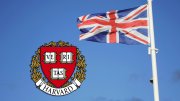As Russia continues its war in Ukraine, many have wondered about the potential consequences for Taiwan. Could China be emboldened by Russia’s aggression, or would the costly military stalemate and strong Western response discourage a reining in of Taiwan? For Steven Goldstein, emeritus professor of government at Smith College and associate of the Fairbank Center of Chinese Studies, the answer is closer to the first: recent events will reinforce, rather than deter, China’s designs on Taiwan.
Goldstein, who on Monday delivered the talk—“Ukraine Today, Taiwan Tomorrow?”—through the Harvard Kennedy School’s Belfer Center of Science and International Affairs, said that it is clear China is in a weaker position than before the invasion. “They’re preaching the importance of sovereignty, the important of non-aggression, the importance of respect for boundaries, non-exploitation,” he said, “but they’re also more than tacitly supporting the Russian position on Ukraine…so there’s an erosion of goodwill.” There’s also an indirect repudiation of the country’s military strength, as Russia’s army—which regularly drills with China’s People’s Liberation Army—is underperforming. Taiwan is also learning lessons from Ukraine’s response, Goldstein said, adding “It’s a perfect place for asymmetric guerilla warfare.”
But Goldstein doesn’t think any of these weaknesses will discourage China from taking greater control of Taiwan. “Policy and capacity are never in sync,” Goldstein said. “It depends on how strong the will is. And in the case of China’s relations with Taiwan, the will overwhelms the capacity.” Goldstein points out that as far as the population is concerned, Taiwan’s connection to China is a crucial element to the Communist Party’s legitimacy. “Any leader, even Xi Jinping himself, views his political position as tied to the credibility of his policy towards Taiwan,” said Goldstein. “The one nightmare for the Chinese is that they'll lose Taiwan… As far as any Chinese leader is concerned, that just can’t happen.”
Of course, when and for what reason China would decide to intervene is uncertain. In 2005, the Chinese government adopted an “Anti-Secession Law” that dictated the circumstances under which China would use force in Taiwan—including if Taiwan declared its independence. However, one of the very last conditions was that should “possibilities for a peaceful reunification… be completely exhausted, the state shall employ non-peaceful means and other necessary measures to protect China’s sovereignty and territorial integrity.” “Now that’s a very fuzzy line,” Goldstein said. “Because what they’re saying is that when we determine that our deterrence has failed… then we will have to use force.”
Likewise, the U.S. response to Chinese provocation can vary. Currently, said Goldstein, the U.S. policy is one of “strategic ambiguity” when it comes to Taiwan: “We say to the Chinese, ‘If you attack, unprovoked by a declaration of separation, we will defend Taiwan.’…And we say to Taiwan, ‘If you declare independence, you’re on your own.’” Under this policy, which Goldstein supports, both sides are incentivized to maintain a peaceful, albeit tense, status quo. But Goldstein recognizes that the U.S. is ultimately protecting its own interests; even if Taiwan is attacked, a strong U.S. response is not guaranteed. “I mean, we let the Saudis cut up an American correspondent,” he said. “And we didn’t do anything, because Saudi Arabia was too important.”
In all, Goldstein said, the Russian invasion of Ukraine has diminished the credibility of the Chinese government and put the country in an overall weaker position geopolitically—with nations like Australia and Japan becoming more likely to come to Taiwan’s aid in the event of a conflict. But judging by China’s recent reining in of Hong Kong and determination to uphold its One China principle, the current geopolitical situation “presents the danger of a more immediate crisis over the Taiwan crisis than one might expect,” he said. “And that deserves, I think, more careful handling."









